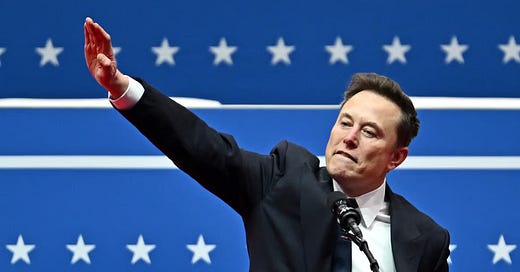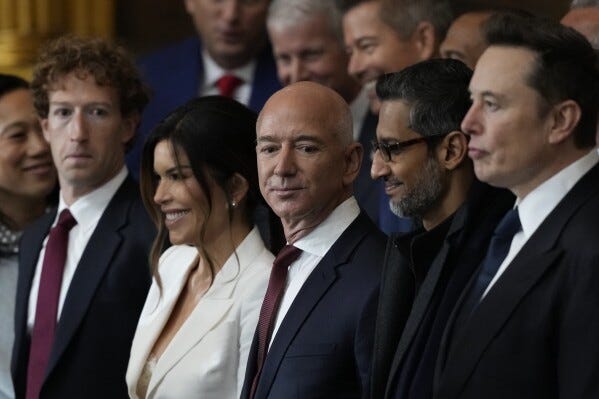Before I even begin, let me be clear: I have no love for Elon Musk. I don’t admire him. I don’t think he’s a genius. I don’t even think he has good ideas. Musk is the kind of overhyped neurodivergent tech bro that Silicon Valley keeps churning out—a dweeb who stumbled into absurd levels of wealth and power thanks to an accident of history. He’s not a visionary; he’s the product of a confluence of forces that have created an environment where people like him—socially awkward, overly confident, and deeply unserious—can amass unfathomable amounts of money and influence. And why? Because all of the same qualities that make Musk insufferable at parties and make everyone around him uncomfortable—his inability to read the room, his unearned arrogance, his desperate need to be seen as the smartest guy alive—are the very traits that this system elevates and rewards. (It’s why Musk, Trump, Zuckerberg, Bezos, and Marc Andreessen all seem to carry an unspoken preoccupation with being seen as important and worthy. Andreessen calls this “the deal”—that if you create massive value (read: money) in Silicon Valley, then the whole world should love and respect you.)
To be clear, Musk isn’t a National Socialist. That’s important to say because there was a lot of noise online about Musk doing a gesture reminiscent of a Nazi salute during Trump’s latest inauguration. Was it fascism? No. It was the uncoordinated flailing of a man who’s clearly never been picked for a team sport. If Musk were on a recreational softball league, the other players would trade him to sabotage their rivals. Physically, this man is a poison pill. He’s not a National Socialist; he’s a dancing idiot.
But focusing on Musk’s clumsy gestures is to miss the point. The real problem isn’t Musk’s embarrassing presence—it’s the horrifying vision of America painted at Trump’s inauguration. Listening to Trump, it’s like he inhabits a completely different country. In his version of America, the streets are overrun with “millions” of undocumented immigrants who need to be deported. He seems to believe this can be done easily—just gather up families, separate them, and lock them in camps. This, to Trump, is the solution. Never mind that the infrastructure for mass deportations doesn’t exist. Never mind that most Americans, even some of his own voters, aren’t ready to walk into their neighbors’ homes, drag out entire families, and send them away. It’s a grotesque fantasy, but it’s one he wholeheartedly believes in. (As an aside, how was it impossible to mobilize funding for solving a homelessness crisis but somehow, amazingly, there is no such concern to build what will be massive camps and transportation infrastructure for ridding the US of such “vermin,” in Trumps words?)
Hannah Arendt wrote about the erosion of truth and reality in totalitarian regimes, and this feels like a modern version of it. Trump doesn’t just lie; he erases the complexity of the world to make it fit his ego. He imagines a United States that can reshape reality to suit his will, and that belief is what makes him dangerous. His desire to resurrect the Alien and Sedition Act of 1798—an actual law that once made it a crime to criticize the government—and his unprecedented push to end birthright citizenship enshrined in the 14th Amendment are just two examples of how his delusions pave the way for real harm. This isn’t just about his disdain for facts—it’s about his pride, which, as always, stems from his desperate need to project power in the face of his own feeling of inferiority.
That need for others to see him as strong, capable, and important bleeds into everything he says and does. Take his inauguration speech, where he declared the United States should “take back” the Panama Canal. Not renegotiate a deal, not partner with Panama—just take it back, like a neighbor retrieving a ladder he loaned out years ago. It’s the kind of simplistic, juvenile view of power you’d expect from someone who learned geopolitics through Monopoly. The Panama Canal hasn’t been a U.S. possession for decades, but the point isn’t about ownership—it’s about the laughable notion that we could just march in and claim it and the story would end there. Trump doesn’t understand complexity, whether it’s the intricacies of diplomacy or the reality that other nations don’t exist solely for America’s convenience. For him, projecting strength is the goal, no matter how ridiculous the projection.
And then there’s the music. At the Capital One Center, between speeches at Trump’s inauguration, they played Enter Sandman by Metallica. Of all the songs to choose for such a moment, this was the one. Not Born in the U.S.A., not Fortunate Son—songs that engage with America’s identity and are misunderstood to be straightforwardly patriotic by the right—but a track about being lulled into a nightmare. That’s what they went with. It wasn’t horrifying; it was stupid. It was ignorant. It was tone-deaf in a way that only this crowd could manage. These are the people who aren’t paying attention to what’s playing on the radio as they gun the car’s engine toward a sheer cliff, believing the wings they’ve duct-taped to the side of the chassis are going to make them fly. The whole event felt like it had been programmed by a group of high school vice principals.
The entire spectacle was masturbatory. Nothing cool happened. It wasn’t inspiring or powerful or even interesting. It was just lame. Trump’s circle is a collection of America’s biggest dorks, dweebs, and losers—people who weren’t invited to parties and didn’t get pussy in high school and have been cosplaying as the world’s most important figures ever since. They’re not just embarrassing; they’re boring. And they’ve somehow made America boring, too.
The thing about this crowd is that they screw up at the margins because they’re too self-absorbed to notice what’s going on around them. But here’s the kicker: if they screw up in the margins, they’ll screw up in the main. And they are. This isn’t a warning, that came long ago and nobody gave a shit. It’s not a call to action. It’s just stupid. We’re living in a country run by people who mistake their own reflections for greatness. And honestly, I can’t decide if it’s funnier or sadder that they can’t tell the difference.






Could you let me know which Hanna Ardent essay / excerpt where she talks about truth? Would like to check it out.